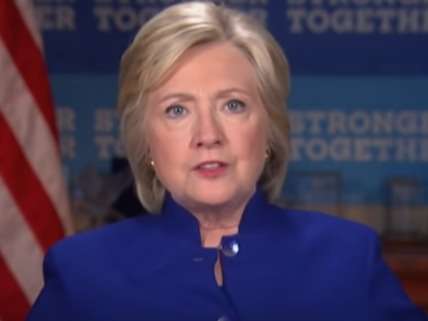Why Was Clinton's Campaign Weak Enough to Be Killed by a Mealy-Mouthed Letter?
Bill Clinton joins his wife in blaming FBI Director James Comey for her humiliating loss.

Bill Clinton says his wife would have been elected president if it weren't for FBI Director James Comey and those democracy-destroying Russian hackers. "I watched her battle through that bogus email deal," the former president said yesterday as he cast his New York electoral vote for the Democratic nominee. "She fought through everything, and she prevailed against it all….Then at the end we had the Russians and the FBI deal….She couldn't prevail against that."
To back up his argument, which echoes what his wife said several days after the election, Clinton cited data journalist Nate Silver, "the finest vote counter in America," who "told you what cost her the election." Silver actually said the impact of the emails obtained by the Russian hackers was hard to measure "because it was drip-drip-drip," with embarrassing revelations spread out over several months. He did argue that the outcome of the election was affected by Comey's October 28 letter indicating that new evidence had emerged in the investigation of Hillary Clinton's email practices as secretary of state. Silver noted that Clinton lost about three points in national polling after the letter came out, when her lead shrank from 5.7 to 2.9 points.
But a better question, as Nick Gillespie suggested last week, is why Clinton, as a seasoned and supposedly respected politician facing a widely derided reality TV star with no experience in public office and higher negative ratings than any other major-party presidential nominee in the history of polling, did not have a bigger lead to begin with. "It's impossible to overstate how big a favorite the former secretary of state was in both her primary fight against Bernie Sanders and the general election matchup against Donald Trump," writes Washington Post political columnist Chris Cillizza. "She was the biggest non-incumbent front-runner for the White House in modern political history."
If Clinton had been ahead by a few more points before the Comey letter, Silver's analysis suggests she would be the one taking the oath of office on January 20. "Why aren't I 50 points ahead?" Clinton wondered a couple of months before the election. Even nine or 10 points would have done the trick, notwithstanding Comey's letter.
How did Clinton go wrong? Cillizza counts the ways, marveling at her terrible performance as a candidate:
From the start, it was clear that Clinton's appeal on paper didn't match her appeal in the real world of political campaigning. She badly underestimated [Bernie] Sanders's appeal from the start and then, because of ongoing doubts about her commitment to liberal causes, found it difficult to attack the senator from Vermont. As a result, a primary that was expected to be a coronation turned into a long-lasting problem—exposing the lack of enthusiasm for Clinton, particularly among young voters.
A general-election matchup against Trump was expected to be a fix for what ailed Clinton's primary effort. After all, faced with a choice between Clinton's deep résumé and Trump's bluster and showmanship, voters really had only one serious option, right? Clinton might not be exciting or represent the change voters wanted but no way, no how would people pick Trump, right?
Those assumptions led Clinton to run a campaign that can be summed up thusly: "I'm the one not named Donald Trump in the race." Turns out that wasn't enough for voters. Trump, for all his talk and inexperience, represented radical change. Clinton represented more of the same politics people hated.
She lost because she was overly cautious. Because she was slow to adjust to a changed race—in the primary and the general election. Because she never really connected with voters. Because she offered no positive message that resonated with those voters. Because she never grasped the import to her candidacy of the email story. Because she simply wasn't a good candidate.
Clinton's failure to understand the significance of what her husband derisively calls "that bogus email deal" is particularly salient because the controversy highlighted the haughtiness, secretiveness, and shiftiness that help explain her remarkably low approval ratings. Some polls even found she was less trusted than Donald Trump, a champion prevaricator. Had she been more forthcoming from the beginning, the controversy would not have dragged on long enough to trip her up once again in the final weeks of the campaign.


Show Comments (253)